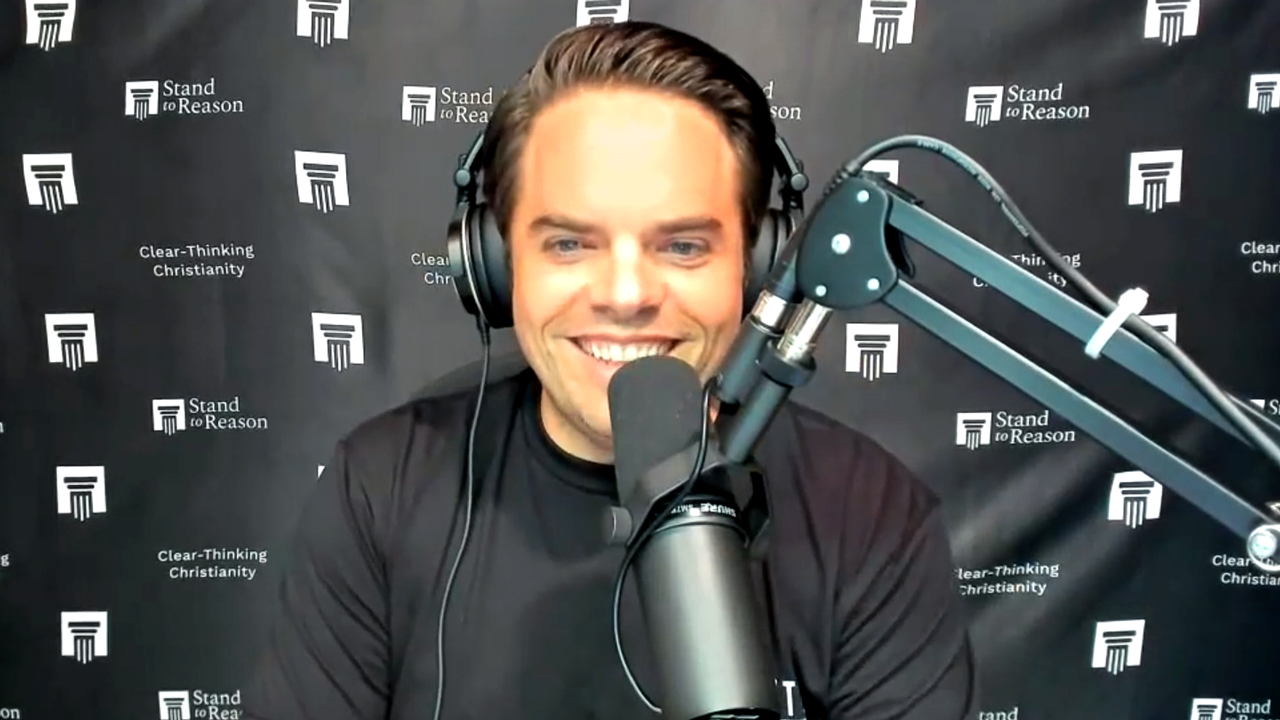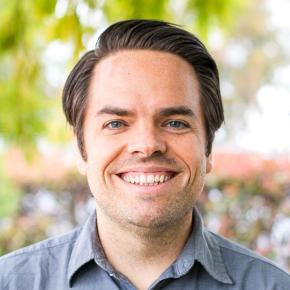Amy, Jon, Robby, and Tim give practical tips for how you can bloom where you’re planted and remind believers that they don’t need to know everything before they start sharing the gospel with others.
Transcript
Robby: Let’s pretend there’s some 20-year-old kid out there who’s a sophomore or junior in Bible college learning about apologetics. They want to do this. They listen to Amy all the time, and they say, “Man. If I could be as smart as Amy and do apologetics full time.” What are some practical tips that we can give them to start implementing now? Like Greg would say, how can they bloom where they’re planted now? What can they do now to be an apologist where they’re at?
Jon: I have two. One is to study. Know your stuff. And the second is, I would say, do your best to find a mentor. Find somebody that’s further along than you, and try to attach yourself to that person. Or, if you have goals—“I want to be an apologist with Stand to Reason”—try to attach yourself to somebody who is doing that, and then they can help you, hopefully.
Tim: I see a lot of young apologists online and some of the stuff they’re posting, and, this kind of thing, it makes me cringe. I remember when I was in mid 20s and early 30s. I see myself when I when I read some of their posts, and I, honestly, can look back and see the impact that Greg Koukl has had on me as an apologist. I was following Greg and this show and the website and all that stuff before. He was mentoring me from a distance. But, of course, coming on staff, having someone who can personally call me up and say, “Tim, cut it out,” or having Amy there to say, “Tim, that’s too aggressive. Strike that. You don’t need to say that to make your point.” So, having people like Amy and Greg mentoring me has changed me as an apologist for the better, and I think we all absolutely need that.
Robby: One guy who mentored me—I was in this mentorship group with some other guys from Biola—was Clay Jones. You know what he talked about the whole time? It was all about character and morality. We never got into apologetics. In your head, you’re like, “Oh, this is going to be great. We’re going talk about the problem of evil all the time.” No. He said your character matters more than that kind of stuff, and that’s the kind of mentorship you need. You need somebody who gets it and knows, okay, here’s how you need to live your life for the Lord and cultivate a relationship with him. So, I totally agree with that, Jon. A mentor is vital, and if you don’t have a mentor in your life right now, get one.
Tim: And, Jon, going to your first point where you said study, absolutely we need to be reading up on the apologetic arguments and all that stuff. Also, I read the apologists first. I was reading what apologists say about Richard Dawkins and his arguments, and then it was, like, no. I’ve got to go read Richard Dawkins for myself. What is his argument? So, don’t just look at it from our side. Go see. Read what they say. Read their own words in their context and understand it. I think that will help because there’s this kind of confirmation bias that we all have, no matter what your worldview is, and one of the ways you can minimize that confirmation bias is to look at the arguments on the other side and reading the other side and being familiar with it. Amy, what are some tips you have for budding apologists?
Amy: Make it a priority to read through the Bible at least once a year, especially if you’re young. What you need to do is start putting money into that account now and think about how well you’re going to know it in 20 years, and this is more important than ever. It’s not even just that. It will shape your character and help you to know God better and all of that, but also, right now, the Bible’s under attack. People think the Bible’s evil. People have all sorts of arguments against the Bible, and we need to understand it. We need to understand the big picture. We need to be able to respond to these theological questions. There are so many theological questions happening right now. So, don’t neglect your Bible, and, in fact, make it a priority, and start reading through it at least once a year. That was the best advice anyone ever gave me back in grad school. It was Walt Russell. And he said to read through the Bible once a year and read through the New Testament twice a year, and you can do it more than that. You don’t have to—you don’t have to only do it that many times. But if you make that a goal, just think about where you’ll be in 20 years if you keep learning more and more about it. That will help your apologetics in incredible ways.
Robby: That’s an excellent point, and I think even memorizing Scripture, you know, gets thrown into that because then the Holy Spirit uses that in your life. But, Amy, I imagine you get these #STRask questions that come in, and, in your mind, you know, oh, well it says this in Isaiah about that, and then it says this in Matthew, and you’re the Thompson Chain Reference Bible in your own mind because you’ve spent time studying God’s Word. It’s an amazing thing, when you invest time in God’s word, what he does with it and how you can respond.
Well, one thing that I struggled with early on and I think is really important: It’s easy to look at Tim Barnett and Jon Noyes and Amy Hall and to go, “Oh, man. So, if I want to be an apologist, what I need to do is have a YouTube channel and a radio show and a platform and a cool graphic and some nice intro music, and then I can start doing apologetics.” Whereas, you just need to go share with people now. If you’re not out there sharing with people, then you’re not doing apologetics. You’re learning a lot of stuff. That’s good, because it’ll give you confidence in your faith. Especially in undergrad, I felt like I was perpetually sharpening a sword that I was never going to use, and I don’t think that’s the goal of this endeavor. We’re meant to be ambassadors for Christ, which means talking with other people.
Tim: So, what you’re saying is just go do it. Don’t wait. If you think, “Well, I just got to read this book, and then I’ll be able to do it,” what’s going to happen is you’re going to find out, hey, there’s a whole lot more you don’t know, and then you have to read another book, and then you have to read another book, and then it’s—I’m telling you, I’ve experienced this, where it’s almost paralyzing, where you think, “I guess I shouldn’t say anything ever,” because there’s always something more. There’s always going to be the new argument or the new book. Or have you read this? Or have you read that? Every year, my bookshelf—the stack gets higher and higher. I stopped buying books that I am not going to read because if I don’t have time for it, it’s going to stay on Amazon. it doesn’t show up in my house until I can read the thing. So, this is because it becomes, for me, psychologically overwhelming to see a stack of twenty books. Where do I even start? If I have one there, I can pick that up, and I can bring it with me on my flight to California to record a radio show.
Robby: When it becomes a whole paralysis by analysis, and you never get off the bench, and you never share with anybody. Which, if we have to be perfect before we can share, none of us can share. But Jesus is good and gracious, and he even uses our feeble attempts when we are sixteen and now to spread his word and share the gospel.
Tim: When I was in teachers college, and I was being inundated with questions and challenges, I didn’t know anything, and they would ask me a question, and, honestly, it was like, I don’t know, and then I went home, and I’d look for the answer. I’d come back, and I would give the answer, and they’d say, “Okay, that explains that, but what about this?” And I don’t know.
It was that kind of process, and, honestly, for me, that development was absolutely essential in my growth as an apologist and falling in love with providing answers and all that. So, that’s a great piece of advice. Just do it.
Robby: So, let me recap these points you guys have made. Jon, you said study and know your stuff, and then, Tim, you added to that a little bit about how we need to read the other side. We can’t just read our side about the other side, but we should go read the atheist. We should read the Book of Mormon. We should read the Quran. Finding a mentor, somebody who’s further along than you spiritually who can pull you up—who can guide you. We all need a Paul in our life. We need somebody who’s there. We also need to make it a priority to read through the Bible regularly. Amy, I love that. And it sounds like such a no-brainer, and it’s so simple. It’s Sunday school 101, but when I don’t do it, I am not in the right space to do apologetics well. It’s just the truth. Read your Bible and pray every day and you’ll grow, grow, grow.
Jon: Can I add one? Go to church. Get involved in your local church. If you want to be a Christian apologist, be a Christian apologist in your local church. Never, never lose your love for the local church.

